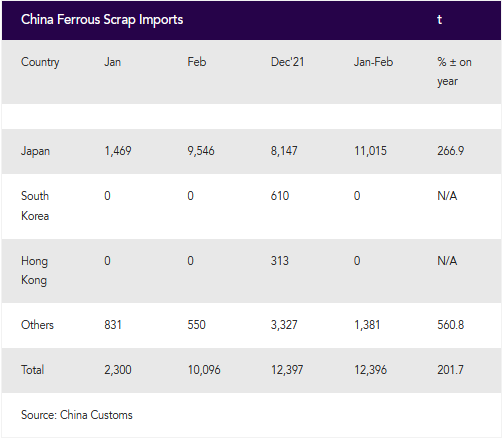Posted on 28 Mar 2022
Chinese scrap imports stayed limited in January and February on the back of diverging prices in the domestic and international market.
Imports in January-February tripled from the same period last year to 12,400t, according to Chinese customs data. The import data is for ferrous scrap HS codes 720410, 720441, and 720449, which exclude categories for stainless steel scrap and alloyed steel scrap.
The Chinese government allowed scrap imports to resume on 1 January 2021. Trading activities were thin in the first two months as market participants were waiting for the first two vessels to clear customs successfully. Although imports in January-February this year rose by 201.7pc from the same period 2021, the volume imported in each of the months was far lower than average monthly imports in 2021 at 33,600t.
Supplies from Japan made up the majority of China's imports in January and February, while imports from South Korea and Hong Kong — the top three suppliers in 2021 — were zero. The rapidly shrinking import volume has prompted global suppliers to move their attention away from China. "I didn't offer to the Chinese market [during] these months, the price gap is too wide," a Japanese trader said.
Chinese buyers' interest in imported scrap waned after both the price and demand of scrap fell amid market cooling measures and production cuts since mid-2021. Entering 2022, Chinese buyers still stayed on the sidelines as international scrap prices were becoming more expensive because of ferrous product shortages in the global market.
Chinese domestic heavy melted No.3 scrap prices were mostly flat and recently edged up slightly to Yn3,870/t at Shagang, netting back to $540/t without 13pc value-added tax. The price of equivalent-grade HS paid by a South Korean buyer was nearly $90/t higher than the Chinese domestic price, making it impossible to export scrap to China. The HS fob Japan assessment increased by ¥15,500/t ($127.30/t) from the end of 2021 to ¥69,500/t ($572/t) fob on 18 March.
Market participants do not expect Chinese scrap buyers to resume active purchasing unless ferrous scrap increases and matches international price levels, with support from the steel sector.

Source:Argus Media